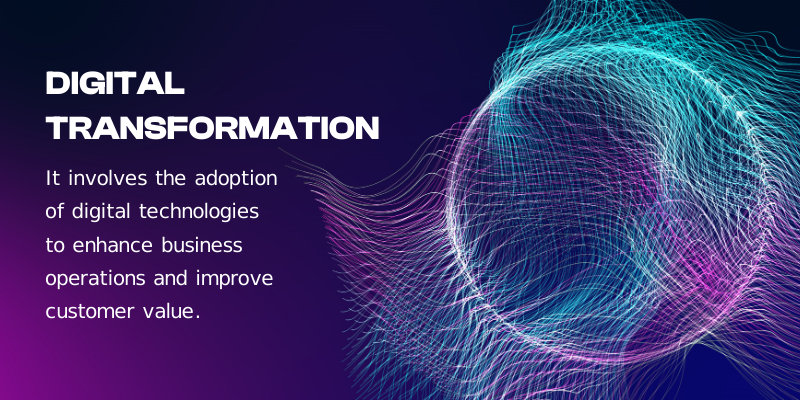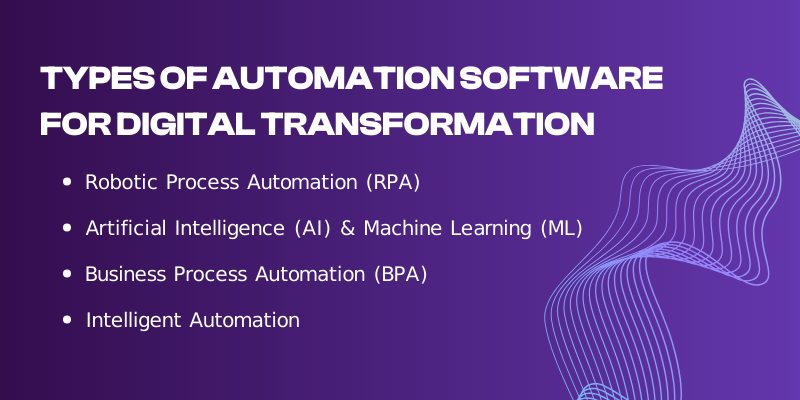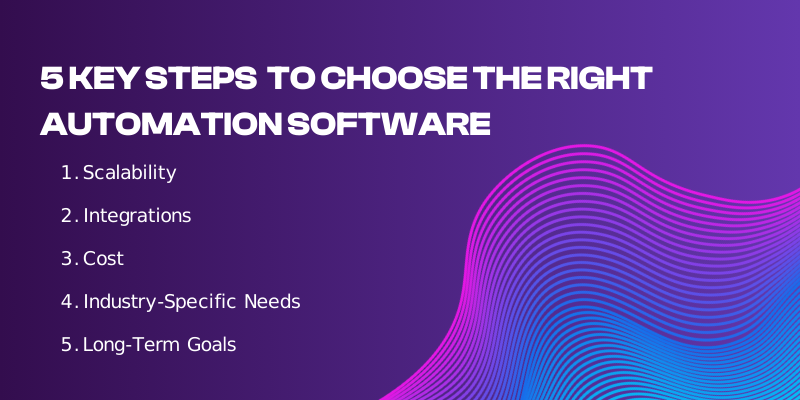Digital transformation is the process of adopting digital technologies across all aspects of a business to fundamentally enhance operations, improve customer experiences, and drive business growth.
It encompasses a shift from traditional, manual processes to more automated, data-driven practices, empowering organizations to adapt to market demands and stay competitive in a rapidly evolving landscape.
or example, many retailers often wonder what are five marketing strategies that retailers spend half of their annual budget on, as digital strategies are integrated to stay relevant in an increasingly competitive market.
Digital transformation affects everything from customer interactions and internal operations to supply chains and product development.
At the heart of the best automation softwares for digital transformation lies the ability to streamline complex business processes and optimize productivity.
Automation software plays a pivotal role in eliminating time-consuming manual tasks, such as data entry, reporting, and workflow management, allowing businesses to focus on more strategic initiatives.
What is the digital marketing strategy that tracks users across the web? This type of advanced automation ensures businesses have real-time insights on their customers, optimizing user journeys and engagement, often through AI-driven tools.
For instance, Robotic Process Automation (RPA) can be used to handle repetitive tasks, while Artificial Intelligence (AI) helps in making data-driven decisions in real time.
Automation software is not just about improving efficiency it also fosters innovation.
By automating routine processes, businesses can free up resources that would otherwise be spent on mundane tasks, enabling employees to focus on creative problem-solving and high-value projects.
Moreover, automation allows businesses to rapidly scale, adapt to changing market conditions, and implement new technologies with minimal disruption.
Ultimately, automation software becomes an essential enabler of digital transformation, providing businesses with the tools needed to thrive in the digital age.
What is Digital Transformation?
Digital transformation refers to the integration of digital technologies into all areas of a business, fundamentally changing how organizations operate and deliver value to customers.

It goes beyond just implementing new technologies; it involves a cultural shift within an organization, where traditional processes, operations, and business models are adapted to leverage digital innovations.
The goal of digital transformation is to enhance customer experiences, improve operational efficiency, and enable new business models or revenue streams.
Digital transformation can involve a wide range of technological advancements, such as cloud computing, data analytics, artificial intelligence (AI), and automation software.
These tools help organizations become more agile, scalable, and data-driven, enabling them to stay competitive in an increasingly fast-paced, technology-driven market.
Why Businesses Are Investing in Automation for Their Transformation Journey?
As businesses embark on their digital transformation journey, investing in automation has become a strategic priority.
Here’s why:
- Increased Efficiency: Industrial Automation Solutions streamline repetitive tasks, saving time and allowing resources to focus on higher-value activities.
- Cost Savings: By reducing manual labor and minimizing errors, automation helps lower operational costs while maintaining quality.
- Improved Decision-Making: Automation accelerates data processing, providing timely insights for better decision-making and responsiveness.
- Enhanced Customer Experience: Automation delivers faster, more personalized services, improving customer satisfaction and engagement.
- Scalability: Automation enables businesses to scale operations without increasing workforce size, ensuring efficiency and quality during growth.
- Innovation Enablement: By automating routine tasks, businesses can focus on innovation, driving new technologies, products, and services, and supporting Why Do Businesses Need B2B Web Development.
Explore Our Digital Transformation Services!
4 Types of Automation Software for Digital Transformation
Digital transformation is driven by various the best automation softwares for digital transformation that address the specific needs of businesses.

Each type of automation technology offers distinct capabilities, helping organizations streamline their operations, improve efficiency, and foster innovation.
Some businesses even turn to a tech marketing agency or specialized oil and gas marketing agency to gain expertise in automation and digital marketing strategies.
Below are the primary types of automation software reshaping industries today.
1. Robotic Process Automation (RPA)
Robotic Process Automation (RPA) involves using software robots (or “bots”) to automate repetitive, rule-based tasks that are traditionally done by humans.
RPA is especially effective for processes that require interaction with multiple systems or applications in a structured and standardized way.
By automating these tasks, businesses can significantly reduce errors, speed up processes, and free up employees for more strategic work.
2. Artificial Intelligence (AI) and Machine Learning (ML)
Artificial Intelligence (AI) and Machine Learning (ML) are technologies that enable machines to simulate human intelligence and learn from data.
AI focuses on mimicking human cognitive abilities, while ML allows systems to improve their performance by analyzing data and recognizing patterns.
These technologies are reshaping industries by automating decision-making, enhancing data-driven insights, and enabling intelligent automation across business operations.
3. Business Process Automation (BPA)
Business Process Automation (BPA) refers to automating end-to-end business processes across various departments and systems.
Unlike simple task automation, BPA streamlines entire workflows, from data collection and processing to decision-making.
It allows businesses to eliminate inefficiencies, improve accuracy, and reduce the need for manual intervention in complex processes, ensuring smoother and faster operations across the organization.
4. Intelligent Automation
Intelligent Automation (IA) is the combination of Robotic Process Automation (RPA) with Artificial Intelligence (AI) and Machine Learning (ML) to create more advanced automation systems.
By integrating AI and ML, IA systems can handle more complex tasks that involve unstructured data and require real-time decision-making.
This enables businesses to automate dynamic processes, predict trends, and improve overall operational efficiency with smarter, more flexible automation solutions.
Explore Our Web Design & Development Services!
Top 6 Automation Software Solutions for Digital Transformation
Here’s an overview of top automation software solutions driving digital transformation across industries:
1. UiPath
UiPath is a leading Robotic Process Automation (RPA) platform known for its user-friendly interface and extensive capabilities.
It offers tools like UiPath Studio for designing automation workflows, Orchestrator for managing and monitoring robots, and Robots for executing tasks.
Key benefits include scalability, integration with AI and machine learning, and a robust community and support ecosystem.
2. LiProspect
LiProspect is a cloud-based LinkedIn automation and prospecting tool designed to streamline lead generation and sales outreach.
It automates tasks such as sending connection requests, follow-up messages, and managing outreach campaigns, all while providing insights to optimize strategies.
The platform offers features like automated LinkedIn outreach, a smart inbox for managing messages, personalized messaging with over 15 variables, CRM integration with tools like Zapier and HubSpot, advanced analytics for tracking campaign performance, and support for Sales Navigator to enhance lead searches and engagement.
3. Automation Anywhere
Automation Anywhere provides a comprehensive automation suite that combines RPA with cognitive capabilities.
Its features include Bot Store for pre-built bots, Document Automation for processing unstructured data, and Process Discovery for identifying automation opportunities.
This platform is widely used in finance, healthcare, and customer service sectors to streamline operations and enhance productivity.
4. Blue Prism
Blue Prism offers an enterprise-grade RPA solution with a focus on security and scalability. Its features include centralized management, AI integration, and support for both on-premises and cloud deployments.
Industries such as banking, insurance, and telecommunications leverage Blue Prism to automate complex processes and ensure compliance.
5. Zapier
Zapier is a no-code automation platform that connects over 5,000 apps, enabling users to create workflows (Zaps) that automate tasks across different applications.
Its intuitive interface and extensive integrations make it ideal for small to medium-sized businesses looking to automate marketing, sales, and operational tasks without extensive technical expertise.
6. Kofax
Kofax specializes in intelligent automation solutions, particularly in document processing. Its offerings include Kofax Capture for document capture, Kofax TotalAgility for workflow orchestration, and Kofax RPA for robotic process automation.
These tools help organizations automate document-intensive processes in industries like finance, healthcare, and government.
How to Choose the Right Automation Software?
When choosing the right automation software for your business, it's essential to consider several key factors.

For example, certain content marketing tools may be ideal for businesses in the retail sector, while many digital transformation agencies like Centric might be the best choice for companies undergoing more comprehensive digital change. It's also important to explore SEO ranking report software to continuously assess the success of your efforts.
- Scalability: Ensure the software can grow with your business and handle increased workloads as you expand.
- Integrations: Check if the software integrates seamlessly with your existing systems and tools.
- Cost: Balance the software’s price with its features, ensuring a good return on investment.
- Industry-Specific Needs: Consider software solutions tailored to your industry for specialized features and support.
- Long-Term Goals: Evaluate how the software aligns with your business’s long-term objectives and operational requirements.
The Future of Automation in Digital Transformation
The future of automation in digital transformation will be driven by emerging trends such as Intelligent Automation (IA), which combines RPA with AI and machine learning to handle more complex tasks, and the rise of hyperautomation, where all possible processes, including those involving unstructured data, are automated.
As AI-driven decision-making and natural language processing (NLP) improve customer interactions, companies will need to stay ahead by continuously monitoring technological advancements and adopting flexible, scalable automation solutions.
By investing in continuous learning, collaborating with tech providers, and focusing on adaptable tools, businesses can remain agile, ensuring they are ready for future innovations and maintaining a competitive edge in the market.
FAQ: Best Automation Softwares for Digital Transformation
What is automation software for digital transformation?
Automation software for digital transformation refers to tools and technologies that automate business processes to improve efficiency, reduce errors, and accelerate growth. These solutions help streamline operations across various departments and enable businesses to adopt a more agile, data-driven approach.
Can automation software integrate with existing business systems?
Yes, most automation software solutions are designed to integrate seamlessly with existing business systems, such as CRMs, ERPs, and accounting platforms. This ensures that businesses can automate workflows without disrupting their current operations.
How do I choose the right automation software for my business?
When selecting automation software, consider factors like scalability, integration capabilities, cost, and industry-specific needs. It’s important to assess your business goals and processes to find a solution that aligns with your long-term strategy and enhances your operations.
Conclusion
In conclusion, the best automation softwares for digital transformation offers significant benefits, including improved efficiency, reduced costs, enhanced accuracy, and a more personalized customer experience. By streamlining processes, businesses can unlock new levels of productivity and innovation. As digital transformation continues to evolve, it's crucial for organizations to evaluate their unique needs and carefully select automation tools that align with their goals.
Integrating the right automation software will empower businesses to stay competitive, improve operational performance, and drive long-term success in an increasingly digital world.








